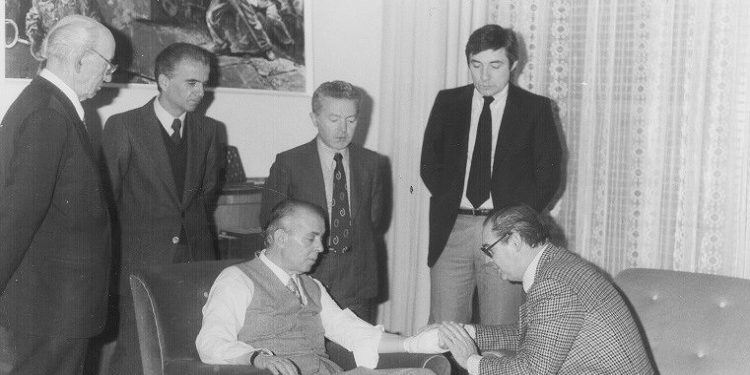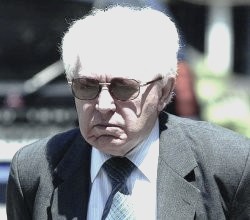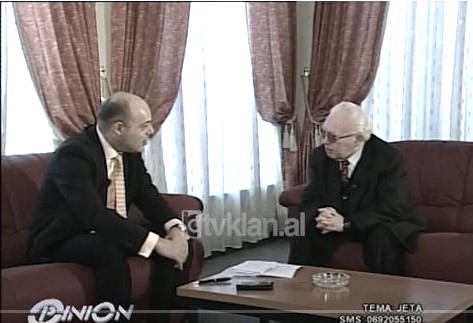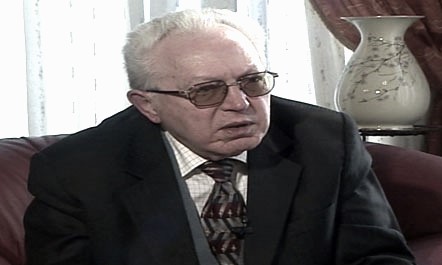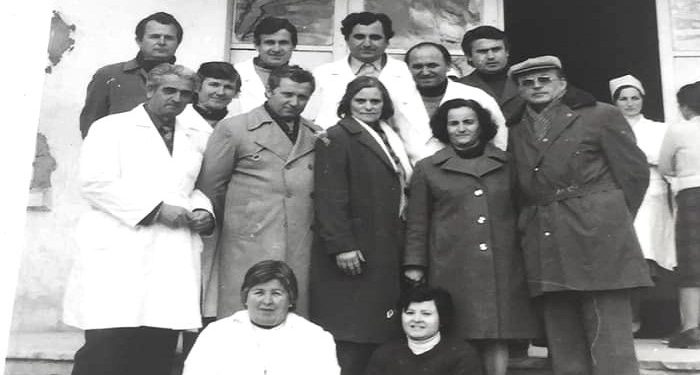By Blendi Fevziu
Part Four
Memorie.al / The renowned physician and academician, Prof. Dr. Ylli Popa, originating from a well-known family with intellectual traditions from the city of Elbasan, graduated in Medicine in Bucharest and Moscow in the late 1950s, a lecturer at the Faculty of Medicine in Tirana and founder of the Albanian School of Cardiology, former Chairman of the Academy of Sciences of the Republic of Albania from 1997 to 2007, former Member of the People’s Assembly before the 1990s, decorated with various medals and orders, as well as the high title “Hero of Socialist Labor,” in 2007, gave a long account of his life and career as a physician and academician to journalist Blendi Fevziu on the show “Opinion” on Tv Klan. More about this, etc., is revealed in his interview, which we are publishing in several issues.
Continued from the previous issue
Dr. Ylli Popa: I told Teodor Keko that I had started writing an article, I had it conceptualized, as I had started writing it, it was halfway done. I told him that if he wanted, he could come and see it. He came home, as we were close by. He read it and put his hands on his head: “Oh my goodness,” he told me, “but this is a bomb!” The next day he told me: “Look, my newspaper does not have a large circulation and this leading article will be lost, and it is better to send it to ‘Zëri i Popullit’.”
He also gave me advice that at the very end, the last part should be linked to the beginning part, from a technical perspective, as I didn’t know and I did as he told me. Since the article was significant and could pose a risk to the people of the house, I gathered my wife, daughter, and son-in-law, who are Mihal Tase, a cardiologist. I told them: “Take this article and see if I should submit it for publication or not”?!
And what was the answer?
“Yes, give it.”
Had you consulted the article with the structures of the Party of Labor?
With no one.
What was the reaction after the publication?
The reaction was very interesting, because many people were extremely enthusiastic. Then, after a few days, they recovered, so to speak, from this shock, because it was a real shock. A situation of jealousy began, that; “Ramiz Alia may have written this article and put my name on it…”?!
What was Ramiz Alia’s reaction?
Not only Ramiz Alia’s reaction, but that of the entire Political Bureau at that time, was that; “fine, he gave his opinion, if you have another opinion, sit down and write to give a response.”
Did you have faith that Ramiz Alia could have a hand in the transformation of the system at that time?
This was a general opinion that I remember very well at the time. After Enver died, people had great hope that Ramiz Alia would make changes. But a year, two years, three years passed, and no changes happened…?!
For what reasons, in your opinion?
It was the party discipline; there were Bureau members who were very savage. It happened to me at that time, because I also made house calls. I went to an old officer, for example, who had a heart condition, and after drinking the customary house coffee, he told me: “What was expected so much from him at that time is not being realized. If he is afraid of anything, or someone is hindering him, let him come out and tell us loudly on television, we who fought, can grab the rifle again to help him!”
You participated in the meeting between Ramiz Alia and the intellectuals, how do you remember that meeting?
I remember it very clearly. That day, I had a temperature of 39 degrees, some virus or flu state, but nevertheless I decided to go. Along the way, I met known people going to the meeting; no one knew what the meeting was about!
Had no one discussed it with him beforehand?
No. Comrade Ramiz took a chair and sat down among us there. Among the 40 of us there, none of us knew what it was about. In his joking way, Ramiz said: “Well, comrades, will you start first, or should I start?”! But what were we supposed to start?!
He first spoke about the party’s achievements and the pressures being made, the calls for change, and that we must defend them. He spoke harshly about the class enemy, etc., etc. Then he asked us; “how do you think about this issue, about pluralism.” There was a general hesitation there.
Is it true that none of you asked him for changes?
No, the issue was whether to have pluralism of opinion or party pluralism.
Did anyone there mention the word; party pluralism?
Yes, yes, everyone said that; it’s not the time for pluralism. But, at that time, it was known that the party wanted pluralism of opinion. Ismail Kadare, for example, addressed him directly: “Comrade Ramiz,” he said, “I am a writer and I do not deal with politics.” Sali spoke about pluralism of opinion, that it is not yet time for party pluralism.
In a word, no help was given. When I left there, I met a doctor, and I told him: “Oh Beni, what did comrade Ramiz do like that?! This meeting also needed preparation. If you think that party pluralism is needed, take 4 or 5 people there and tell them beforehand that things can’t continue like this.”
Do you think Ramiz Alia wanted or did not want pluralism?
He didn’t want it up to that point.
Are you sure?
Yes, yes, I am sure.
Then what was the reason for the meeting?!
He was afraid, afraid of others. At that time, it was rumored that; “there will be demonstrations, blood will be spilled.” Ramiz was afraid of these actions. For example, regarding my article, there were military units in Vlorë, or in Korçë, demanding; “let so-and-so come and explain what he meant by ‘Lost Time'”?! That is, he was under pressure.
How did you receive the changes of the 1990s, the creation of the Democratic Party, and later…?
As a very great event that would certainly have consequences.
After 17 years of pluralism, do you think Albanian democracy is still problematic?
Yes, I think so.
In what sense?
There are many actions that do not align with democracy today. The transition has not ended here yet. Back in ’87 or ’88, I was a deputy at the time, and a deputy came from Holland or Belgium, I don’t know. To honor him, as was done at the time, they took him on a car tour, up to Vlorë, Sarandë, and the road from Gjirokastër. I accompanied this deputy to Sarandë.
In the evening, in Sarandë, we saw a group of children from a kindergarten, with clean white blouses, holding hands, blouse to blouse, in a traditional walk, singing a song, at a street intersection near the coast. The foreigner was amazed and told me: “How charming”?! He also asked me; “what the song says,” and I translated it into French for him. “Interesting,” he told me, “but when these grow up, they will be great loyalists of the party.”
In what sense?
“What is learned at that age will last a long time.”
So, you are saying that the formation we received is very difficult to transform?
Yes, very difficult.
Is this the biggest flaw we have, in your opinion?
Yes, this is one of our flaws. Many of our actions today are from that time.
A derivative of the deformation we received at that time?
Yes. Party militancy is also like that today.
What is the level of Albanian medicine, or are you no longer going?
No, I’m not going anymore.
For how many years?
For 15-18 years.
What is your day like, how do you spend your time?
I am currently waiting here, for 6 months, to hand over the Academy of Sciences, because my mandate has ended. We set it ourselves, for two terms, from four years, that is the maximum, and it will be handed over without any complex. I am also waiting to hand this over. But, during this time, unpleasant things also happen. For a few days, an article appears in a newspaper. The journalist quotes me, as if I gave an interview there, quite long, when I haven’t given this interview!
But how is that possible?! For very important issues, where I give recommendations that the members of the Academy of Sciences should be the heads of the institutes, etc., etc. And that next week, I will give the names of the Academy of Sciences, who are these?! I criticize the Ministry of Education that why are they doing the student reform in this manner?!
You did not give this interview?!
Absolutely nothing. In fact, I called and told him. “Fine, I will look into it,” her boss tells me. Then the journalist calls me here. She came and started crying, the poor girl, a young girl. “My girl,” I told her, “how is it possible that you quote me, as if you have talked to me, and you are at the beginning of your career. This is how you will continue your career…”?!
What was the answer you received?
She started crying: “I’m sorry, I’m sorry, I’m sorry.”
Professor, you have lived in three eras. The time of the Kingdom, I won’t include the war, the time of communism, and currently. Which was the most impressive?
The time of the war was interesting.
Why?
Because there was such an orientation and such a participation of the population that was very important. I, as a clan, also come from the Nosi family, that was Lef Nosi, and he was a very well-known figure and was executed at that time. He was my grandmother’s nephew.
He is the brother of my great-grandmother, and to see his niece, he would come to our house. At that time, I was 12 years old, still a kid. I happened to be on the çardak (balcony) of the house. Lef came and drank coffee; there was also Kol Paparisto, a biologist personality, as well as a participant in the National Liberation War.
Kol was left-wing and Lef was right-wing, I remember as if it were now, that Lef would give him arguments that; “look, communism is bad, they have no family, sister marries brother,” etc…! Kol tried to explain that; “it is not so, these are slanders and they have families,” etc., etc.
This debate between them even got a little heated. But as much as heating is allowed. It stuck in my mind since then. That is, there was a very strong participation in the political life of the time. Consider that I was 13 years old and the first son of the house.
They allowed me to do propaganda in the areas of Çermenikë, the others were armed, but I was 13 years old at the time and I traveled from Funar of Elbasan, up to Orenjë of Çermenikë, village by village, for two weeks straight.
We presented a sketch, supposedly a theatrical piece, where the villagers gathered to watch, and I played the role of a small shepherd who was eventually killed. When they would bury me, they would put that red flag on my body and tell me: “Please don’t laugh here,” so it wouldn’t look bad. The entire population was mixed in.
The Speaker of the Assembly of Albania, Jozefina Topalli, has requested the decoration of Lef Nosi, due to the fact that he is one of the signatories of the Act of Independence of Albania?
He participated in this act, he was the Minister of Post, and he was very active, a man of dignity. When I came to the Academy, one of the reforms I wanted to make, and I discussed it with colleagues, was for the people who got involved in politics at that time, but did not stain their hands with blood, to be reviewed.
He might have been with the “Balli” (Balli Kombëtar), or with Zog, he participated for six months or a year, he worked all his life with his contribution, why should we lose this person? I discussed it with my colleagues here, with Kristo Frashëri, with Rexhep Meidani, with Shaban Demiraj, Jorgo Bulo, Eduard Sulstarova, etc., and they all agreed.
We held a conference for Ernest Koliqi, as he was a figure we wanted to touch upon, and Jorgo Bulo presented it in a very dignified manner and did not mention his collaboration with the Italians at all, but the contribution he gave to literature. No one mentions this as a reform in the Academy and that it would continue further.” Memorie.al




